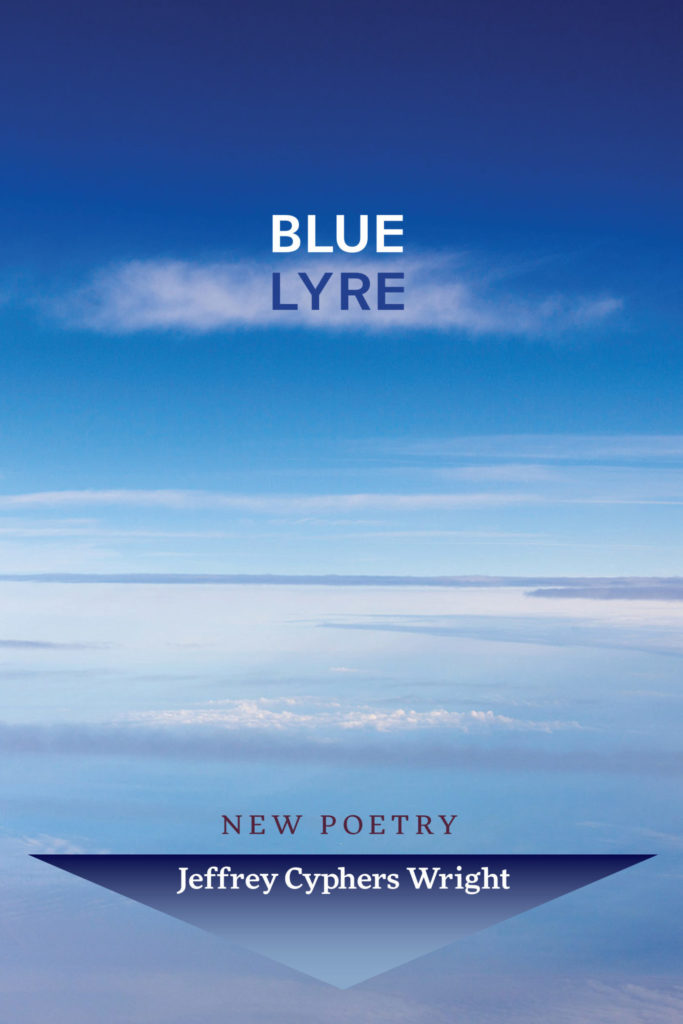Blue Lyre
Blue Lyre, by Jeff Wright.
Dos Madres Press, 2018,
102 pages, paper, $17,
ISBN: 978-1-939929-96-9.
Early in Jeff Wright’s marvelous new book of poems, Blue Lyre, he notes his (partial) affiliation with one writing tradition:
The late Jim Brodey once instructed me
on composing a New York School poem:
“Use blue and name a couple friends”
Here he is being humorous rather than fully descriptive in that the school has many more constraints, in fact, ones so tight that, I would argue, they make it nearly impossible to write a good poem using them. Moreover, as I will explain, the few that go on creating masterful poetry within these strictures—and along with Wright, I would include Barbara Henning and Tom Savage in this crew—all have a strong political bent. I see as the most challenging constraint the rule that a poem should seem to present a series of unrelated, disconnected thoughts that, on examination, reveal an underlying affinity, which (ideally) keys the reader to seeing unexpected, not yet explored connections. I guess you could say that this is metaphor (which does the same thing) writ large.
You might guess, rightly, that few writers can pull this off. To simplify, Henning’s work “clicks” because she combines quotidian detail with (as it were) news clips, as in this sequence from “Sun Deprivation in February”: “Some become used to box-like houses. Snow plows on Avenue A. Lack of a home is a public smear.” Here is set of seemingly near random observations that, on second reading, are sharp-focused on the housing/homeless situation in New York City.
Now Wright describes himself as “an eco-activist” and is known in New York as a strong voice in the urban gardening movement. In his poems, odd, seemingly distracted comments about relationships, bar-hopping, and the creative process, are all tied, sometimes transparently, sometimes obscurely, to an ecological perspective. This is what gives the book so much unity and, dare I say it, heart.
One key element is certainly an abiding love of the outdoors, displayed in numerous lyric lines: “You want to linger a little longer //the last tooth of summer//a shy breeze cooling your brow”: “It’s raining. Crooked trees//wear the greenest moss”; “Sky, drunk on blue,//stitched by geese //Sun a bouquet//of knotted yellow,//cloud flowers//stirred in like cream.”
And it is Wright’s ecological awareness that repeatedly links poems, ones on the verge of fragmentation, into an illuminating unity. So “Meme Quarry” opens querulously and curiously:
You who have a date with Fury,
Set the record straight.
It’s not too clear whether Fury is an emotion, a goddess or something else, but the next line clarifies.
The rug is being pulled out
from under the planet.
The reference is narrowed down, suggesting Fury represents either an aggrieved Gaia or those peaceful eco warriors who are standing up in her name.
References throughout the poems to human-produced catastrophes, such as threats o mass extinction and global warming, not only contextualize stray remarks, giving each poem a strong backbone, but mean that every piece in the book adds to the sense of Wright message: that the current dangers to the natural world should not be and, indeed, cannot be far from any reflections we have as we go through our daily lives, no matter how far removed from ecology they may at first seem.
Before I overdo it, though, I should say that, as my use of the word “partial” earlier hinted not all, though quite many of his poems follow New York School parameters. Included in this volume are other, more straightforward descriptions of the beauty of gardens and the intricacies of human relations. Even so, one of the highlights of Blue Lyre is how in multiple poems, Wright takes techniques developed by the New York School and uses them to infuse poetry with a resonant, resolute ecological mind.
—Jim Feast


